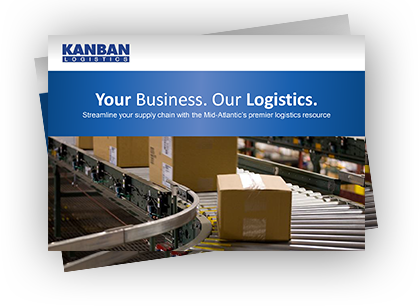If you’re looking for a warehousing provider to store your food products, you’re looking for more than storage space – you’re looking for an expert that will protect the integrity of your products. To help you find your food logistics services expert, we’ve identified 5 key questions to ask your prospective partners.
5 questions to ask your food logistics services provider

1. Can your WMS handle ______? Your provider will manage your warehousing operation with its warehouse management system (WMS). A WMS is the digital cornerstone of the modern warehouse, performing functions such as inventory management, order management and pick and pack/eCommerce functions.
WMS systems are quite expensive on their own (sometimes reaching into the six figures), so utilizing the WMS of a 3PL is a great way to enjoy modern warehouse functionality without an immense price tag. But the system has to do what you need it to do.
For food companies, in addition to your operation’s unique requirements, WMS capabilities should include:
- Customized stock rotation (FIFO, FEFO, or however you need it)
- UCC-128 label support
- Integration with carrier systems (e.g., FedEx, UPS, USPS) and eCommerce platforms (e.g., Shopify, Magento and Amazon)
- Custom reporting of the metrics important to your business
2. Do you perform mock recalls? For makers of food and pharmaceutical products, recalls can occur when a specific lot or batch of products needs to be removed from inventory. As all products are scanned into a 3PL’s WMS upon entry into the warehouse, and every movement within the warehouse carefully managed by the same WMS, such a recall should be relatively straightforward.
To make sure recall events run smoothly and efficiently, however, many leading 3PLs leave nothing to chance. These 3PLs routinely perform practice runs called ‘mock recalls’ that are every bit as thorough as the real thing and follow the same basic process:
- Recall event specifics are outlined between the 3PL and its customer
- The WMS flags the affected products, assigns a hold location for their storage, and prevents them from being distributed
- Recalled items are placed in hold location
- 3PL acts as instructed by customer
3. Can you keep allergens away from my products? When it comes to food warehousing, it can be imperative that certain products are segregated from the general product population. These ‘certain products’ are typically those that contain allergens such as nuts, soybeans and wheat.
When a 3PL stores products containing allergens along with other sensitive food and/or pharmaceutical products, it is that 3PL’s responsibility to ensure that the allergen-containing products are completely segregated, with no opportunity to encounter other products. If allergens are a concern for your operation, you’ll need to have full confidence in your 3PL’s ability to make this happen.
Like a mock recall, the WMS – and its ability to assign products to segregated areas – is a key ally here. But, many 3PLs go a step further and completely eliminate the slightest chance of cross contact by keeping products with allergens in a separate building.
4. Do you provide climate-controlled storage? If your products have specific environmental requirements, you will need a 3PL that can store your products in a facility that is temperature-controlled (regulating just temperature) or climate-controlled (regulating both humidity and temperature).
In addition to the cooling and humidity-controlling equipment your 3PL will use to keep conditions within spec, you will also need to make sure that your provider has the following:
- 24/7 monitoring – ideally both internal and by an external monitoring agency
- A detailed plan for dealing with out-of-range conditions, including customer alerts
- Back-up equipment
- Routine auditing from an external agency to ensure that equipment is positioned properly and functioning optimally
5. Have you been inspected by AIB? As you vet your prospective food logistics services providers, keep in mind that there are expert agencies that may have already inspected them ahead of you. Such agencies include AIB International, formerly the “American Institute of Baking.” AIB is trusted by logisticians across the country to monitor warehouse safety and cleanliness standards.
For a food-grade warehouse, AIB will audit the facility to assess its cleanliness, safety and compliance with Food Safety Modernization Act (FSMA) requirements. A ‘superior rating’ from an agency like AIB means that your provider is likely ‘walking the walk’ when it comes to food industry best practices.
Turn to Kanban Logistics for food logistics services
Based in Eastern North Carolina with over 1 million square feet of warehousing space, Kanban Logistics offers food-grade warehousing at several of its locations. All of these food-grade facilities enjoy a superior rating from AIB International and are further supported by Kanban’s organizational commitment to quality – including ISO 9001:2015 certification. To learn more about how Kanban can serve your East Coast supply chain, contact us today.
Never Miss a Blog Post
Join our email list to receive new posts in your inbox. We will never spam you. Opt out anytime.
Blog Post Categories
- Outsourcing 3PL (72)
- Warehousing (72)
- North Carolina (52)
- east coast logistics (47)
- manufacturing logistics (26)
- Food Logistics (19)
- Fulfillment (18)
- CSX Carolina Connector (17)
- Miscellaneous (14)
- Free Trade Zone (FTZ) (12)
- FTZ / Free Trade Zones (11)
- Intermodal (11)
- Rail Siding (11)
- Port of Virginia (10)
- Cross Docking (7)
- Kitting (5)
- Aerospace (3)
- Pharmaceutical (3)
- Kanban News (2)
- QVC Rework Services (2)
- COO (1)
- container yard services (1)
- flexible (1)
- operations (1)
- scale (1)
- scott freeman (1)






